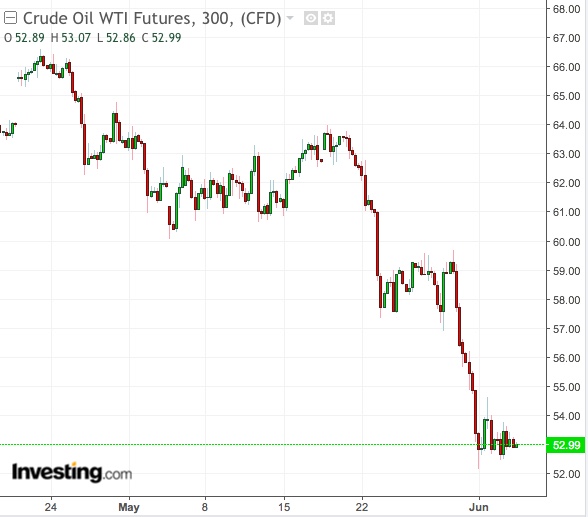Forget oil bears on NYMEX and ICE. Meet a more potent one: Rosneft's (OTC:OJSCY) Igor Sechin.
The chief executive of Russia’s giant oil producer, which also happens to be the world’s largest publicly-traded petroleum company, could singularly do more damage to OPEC now than any crude short-seller in New York or London.
As the Saudis—who head the 14-member Organization of the Petroleum Exporting Countries—work quietly to convince the Russians to stay in their production cutting agreement for a third straight year, Sechin is demanding Moscow walk out or compensate his company.
Putin’s Powerful Ally Denounces OPEC Deal
That’s quite a dare against the government of one of the world’s most feared leaders: Vladimir Putin. But Sechin himself is a close ally of the Russian president, and is often described as his "de facto deputy”. He is in the inner circle of Putin's most conservative counselors and is leader of the Kremlin's Siloviki faction, a lobby gathering former security services agents. And Sechin has made it clear that he couldn’t care less about the fate of the other nine non-OPEC countries that Russia leads in its pact with the Saudis, the alliance collectively known as OPEC+10. His focus is all about protecting the interests of Mother Russia. To that extent, what he says resonates well with his government and country.
Said Sechin, according to Russia’s Interfax news service:
“Does it make sense (for Russia) to reduce (oil output) if the U.S immediately takes (our) market share? We have to defend our market share.”
U.S. crude exports, which had retreated in April after hitting a record high of 3.6 million barrels per day earlier in the year, had climbed again to around 3.3 million bpd two weeks ago, data showed. The Saudis have, meanwhile, been cutting production by record levels and pressuring an increasingly-reluctant Russia to do more export curbs.
Sechin wants all these to stop as he can see U.S. crude filling any vacuum left in the world by Rosneft and other Russian oil exporters. He could also not see any logic in Moscow agreeing to further cuts with the Saudis when Russian oil production was already at 3-year lows from a pipeline contamination crisis that resulted in just 10.87 million bpd being pumped June 1-3, from a May average of 11.11 million bpd.
This is not the first time Sechin has poured scorn on OPEC+10: he wrote to Putin in December to criticize the pact in a letter that was famously leaked.
Should he be rebuffed again, he wants Rosneft to be compensated for its losses in cutting production.

To OPEC, demands from Rosneft's CEO could not come at a worse time. If his words gain traction in Moscow and Putin does hesitate in making another deal with the cartel, that could open up another rocky period for oil prices like in Q4 2018. Already, crude futures are at four-month lows, with West Texas Intermediate on New York’s NYMEX looking likely to crack the $50 per barrel support while global benchmark Brent teeters just above the $60 floor on ICE (NYSE:ICE). WTI lost 16% in May and Brent 11%. Losses amount to as much as 20% or more if observed from the highs of April, officially putting oil in bear-market territory.
To save the market from further collapse, the Saudis need the Russians.
Media reports quoting unnamed Russian sources have been circulating over the past two weeks that the OPEC and OPEC+10 meetings, originally scheduled in Vienna for June 25-26, were being moved to unconfirmed dates in July. The speculation was distressing enough for Saudi Energy Minister Khalid al-Falih to issue a strong but calmly-worded denial at the weekend through an Arab News interview that there will be no change in the dates. Yet, talk of a postponement has persisted, with Tehran officially feeding the rumor mill on Tuesday after Reuters cited a letter quoting Iranian Oil Minister Bijan Zanganeh of indeed disagreeing to the original June meetings. If true, the Iranian decision wouldn’t be surprising given that the Saudis have been tacitly working with the U.S. to try and shut down Iranian oil exports under the Trump administration’s sanctions.
Trade War Worries Might Nullify Positive Impact Of Cuts
Even if the Saudis get another deal going with Russia, there’s no certainty that oil prices will rally as much as they did earlier this year, due to the trade wars the U.S. has with China and Mexico.
With summer in the northern hemisphere beginning in less than three weeks, strong refiner demand for gasoline has been surprisingly absent. Typically, fuel pumps in the U.S. will be reporting strong sales at this time of year as the U.S. driving season kicks into high gear. Crude oil inventories decreased by just 0.28 million barrels in the week to May 24, compared to a forecast draw of 0.86 million barrels. They rose by an average of 5 million barrels in the previous two weeks due to weak refinery runs. Preliminary figures for the week to May 31, issued by the American Petroleum Institute on Tuesday, suggest more bearish numbers, with a crude build of 3.6 million barrels.
Bloomberg opinion columnist Leonid Bershidsky, commenting on the Saudi-Russian pact back in December, said cutting production only made sense if big price increases could be sustained. While OPEC+10 cuts had produced nearly 40% in gains at their highs, now there were less than 20% of those left.
Added Bershidsky:
“Neither Saudi Arabia nor Russia are interested in cutting production so that the U.S. keeps increasing its own and becomes a competitor in global markets.”
